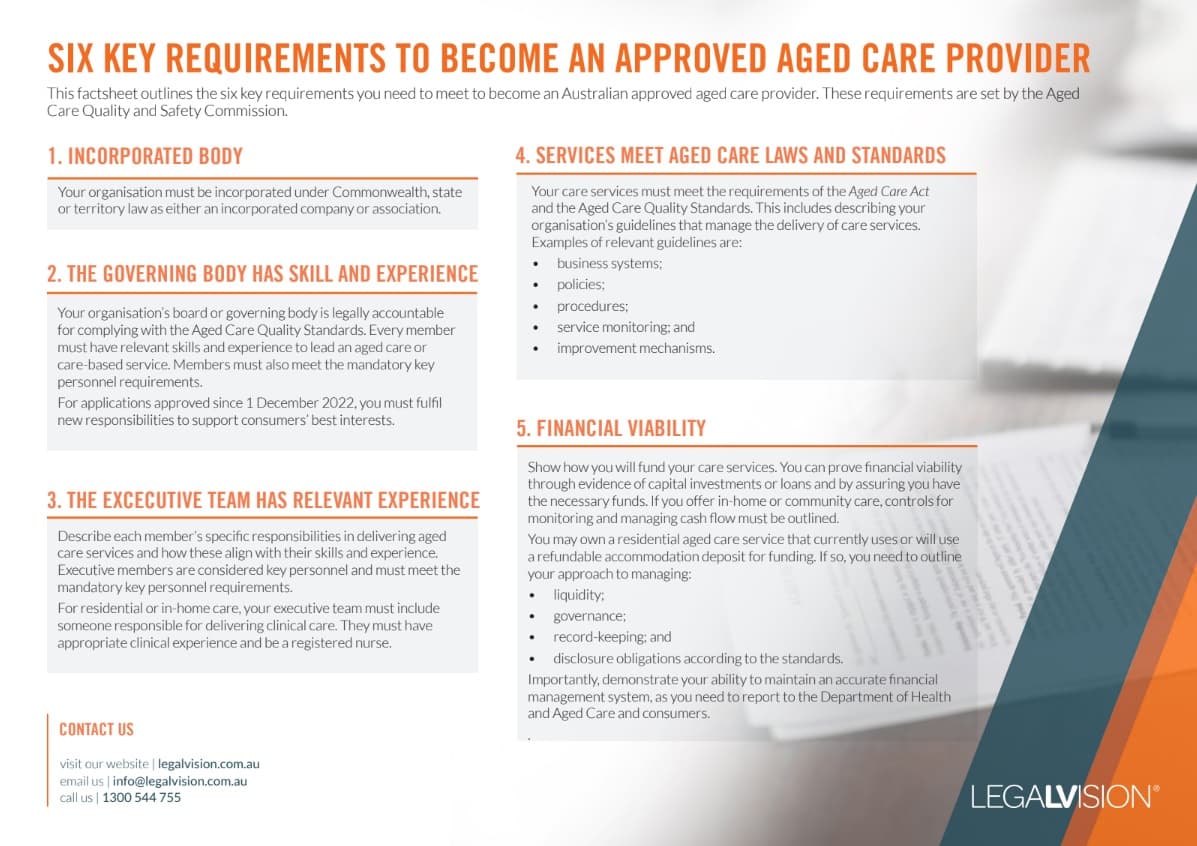As an aged care provider in Australia, you must comply with various legal requirements, which can be daunting. If you are a new business looking to provide aged care services or a seasoned aged care provider looking to refresh your knowledge. This article will summarise the key legal requirements you need to comply with as an aged care provider in Australia.
The Aged Care Act and Principles
The Aged Care Act 1997 (Cth) is the main piece of law that governs the aged care industry in Australia. This Act sets the rules for government-funded aged care, covering:
- funding;
- regulation;
- accountability of providers;
- approval of providers;
- subsidies and fees;
- standards;
- record keeping;
- quality of care;
- rights of people receiving care; and
- penalties for non-compliance.
Numerous principles under the Aged Care Act provide more detail on these rules. Additionally, the Code of Conduct for Aged Care sets standards of behaviour for aged care providers, governing bodies and aged care workers to ensure safe, respectful and quality care for older people.
Mandatory Reporting Requirements
As an aged care provider, you must meet various reporting requirements, especially under the Serious Incident Response Scheme (SIRS). This scheme governs the management and reporting of serious incidents in aged care. Under the SIRS, you must:
- comply with incident management obligations, including maintaining effective systems and practices to prevent and handle all incidents, using an Incident Management System (IMS);
- use data from the IMS to improve your services continuously; and
- notify the ACQSC of any reportable incidents and report to the police when necessary, in addition to managing incidents through your IMS.
Reportable incidents include:
- unreasonable use of force;
- unlawful sexual contact or inappropriate sexual conduct;
- psychological or emotional abuse;
- unexpected death;
- stealing or financial coercion by a staff member;
- neglect;
- inappropriate use of restrictive practices; and
- unexplained absence.
Australian Consumer Law
As an aged care provider, you must comply with Australian Consumer Law (ACL). Aged care recipients will generally have rights under ACL, including honouring consumer guarantees for the services you supply to aged care recipients. Additionally, you must also ensure that your contracts with care recipients do not contain any unfair contract terms in accordance with the unfair contract terms regime. If you do not comply with the ACL, significant penalties may apply.
Employment and Staffing
As an aged care provider, you must ensure your workers meet aged care worker screening requirements. This responsibility is in addition to complying with employment law and work health and safety requirements. It is crucial that your workers comply with any legal requirements and maintain the high quality of care expected for care recipients.
Privacy and Data Retention
As an aged care provider, you will collect, hold, use and disclose a significant amount of sensitive information during your services. You must comply with relevant privacy laws, including the Privacy Act 1988 (Cth) and other laws, such as health records legislation. This includes implementing appropriate measures to ensure compliance and maintain rigorous data security.
Corporate Governance
New rules have been introduced to improve corporate governance in aged care, ensuring care recipients receive the highest level of care. These rules address company constitutions, key personnel requirements, the structure of governing bodies and advisory bodies and reporting requirements. They aim to enhance leadership, culture, transparency and accountability in your aged care business or company.
What are the Consequences of Non-Compliance?
If you fail to comply with your requirements as an aged care provider, the ACQSC can take various actions. In severe cases, your approved provider status may be revoked and civil penalties imposed.
The ACQSC can act on information about unethical conduct that violates the Code of Conduct for Aged Care. They have the authority to investigate, including entering the premises with a warrant. Consequences range from caution letters to banning individuals from working in aged care. The Commission can also refer cases for criminal prosecution to relevant agencies. Additionally, the ACQSC often publishes its non-compliance decisions online.
Reform
The aged care industry is currently undergoing a variety of reforms across all areas and is a priority area for the Australian Government. The Government is developing a new Aged Care Act, which seeks to replace and combine existing pieces of legislation and improve the way services are delivered. Some of these changes will be around establishing a new system of oversight and accountability of providers, creating a new regulatory model and strengthening the powers of the ACQSC.
As of June 2024, the new Aged Care Act is aiming to commence from 1 July 2025. Providers should keep up to date with these changes and updates provided by the Government.

This factsheet will outline the six key requirements you need to meet to become an approved aged care provider in Australia. These requirements are set by the Aged Care Quality and Safety Commission.
Key Takeaways
As an aged care provider, you must comply with various legal requirements that are frequently updated. You must stay aware of and adhere to these obligations, ensuring a high standard of care for older Australians and helping you avoid penalties for non-compliance.
If you need assistance understanding your legal compliance obligations as an aged care provider, our experienced aged care lawyers can assist as part of our LegalVision Membership. For a low monthly fee, you will have unlimited access to lawyers to answer your questions and draft and review your documents. Call us today on 1300 544 755 or visit our membership page.
We appreciate your feedback – your submission has been successfully received.











